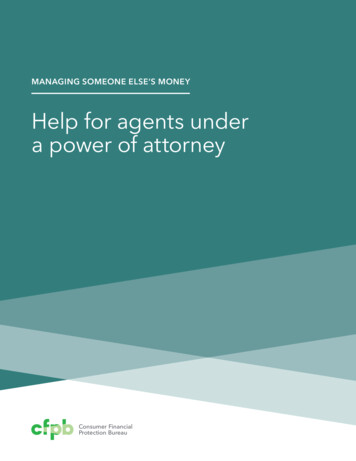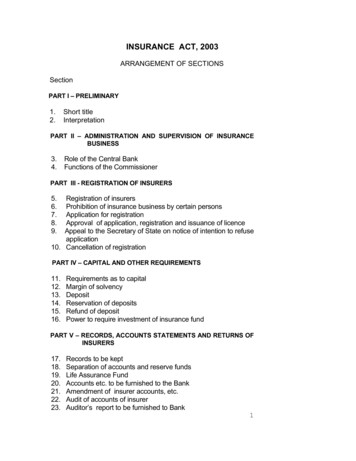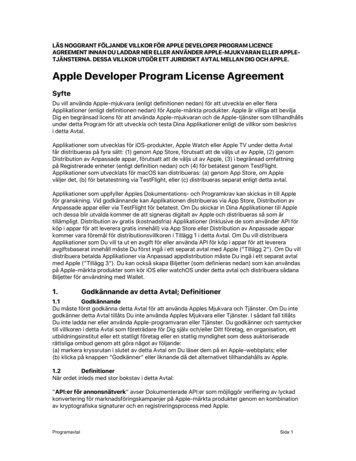
Transcription
MANAGING SOMEONE ELSE’S MONEYHelp for agents undera power of attorneyConsumer FinancialProtection Bureau
About the Consumer FinancialProtection BureauThe Consumer Financial Protection Bureau, or the CFPB, isfocused on making markets for consumer financial productsand services work for families — whether they are applying for amortgage, choosing among credit cards, or using any number ofother consumer financial products. We empower consumers totake more control over their financial lives.The CFPB Office for Older Americans is the only federal officededicated to the financial health of Americans age 62 and over.Along with other agencies, the Office works to support soundfinancial decision-making and to prevent financial exploitationof older adults. To help people (including family members) withlegal authority to handle an older person’s money, the Officecontracted and worked closely with the American Bar AssociationCommission on Law and Aging to prepare this guide.Though the guide was developed by the American BarAssociation Commission, it is not intended to provide legaladvice or serve as a substitute for your own legal counsel. If youhave questions or concerns, we recommend that you seek theguidance of the appropriate legal professional.HELP FOR AGENTS UNDER A POWER OF ATTORNEY 1
2MANAGING SOMEONE ELSE’S MONEY
What’s insideAbout the Consumer Financial Protection Bureau 1Why read this guide? 5What is a fiduciary? 6Power of attorney questions and answers 6Four basic duties of a fiduciary 8Duty 1 Act only in Martina’s best interest 8Duty 2 Manage Martina’s money and property carefully 9Duty 3 Keep Martina’s money and property separate 11Duty 4 Keep good records 12More things you should know 13What if there are other fiduciaries? 13Government benefits require special fiduciaries 13How can you avoid problems with family or friends? 14What should you know about working with professionals? 14Watch out for financial exploitation 15Look for these common signs of financial exploitation 15Be on guard for consumer scams 17How can you protect Martina from scams? 17Where to go for help 20Local and state agencies 20Federal agencies 21For legal help 21For accounting help 21HELP FOR AGENTS UNDER A POWER OF ATTORNEY 3
4MANAGING SOMEONE ELSE’S MONEY
Why read this guide?Like many people, you may never have been an agent under a power of attorneybefore. That’s why we created Managing someone else’s money: Help for agentsunder a power of attorney. This guide will help you understand what you can andcannot do in your role as an agent. In that role, you are a fiduciary. For this guide,a fiduciary is anyone named to manage money or property for someone else.You’ll find brief tips to help you avoid problems and resources for findingmore information.This guide is for family and friends serving as an agent, not for professionalsor organizations. The guide does not give you legal advice. State laws vary,so you may have additional duties. Talk to a lawyer if you have questions aboutyour duties.If you want to learn about making a power of attorney, this guide is not designedfor you. Talk to a lawyer or read other guides about powers of attorney from yourstate bar association or others.Let’s start with a scenario about how you might havebecome an agent under power of attorneyYour family member or friend is worried that she will get sick and will notbe able to pay her bills or make other decisions about her savings andher house. For this guide, let’s call her Martina. Martina has signed a legaldocument called a power of attorney. In it, she names you as her agentand gives you the power to make decisions about money and propertyfor her.The law gives you a lot of responsibility as Martina’s agent under a powerof attorney.You are now a fiduciary with fiduciary duties.HELP FOR AGENTS UNDER A POWER OF ATTORNEY 5
What is a fiduciary?Since you have been named to manage money or property forsomeone else, you are a fiduciary. The law requires you to manageMartina’s money and property for her benefit, not yours. It doesnot matter if you are managing a lot of money or a little. It doesnot matter if you are a family member or not.The role of a fiduciary carries with it legal responsibilities. Whenyou act as a fiduciary for Martina, you have four basic duties thatyou must keep in mind:1. Act only in Martina’s best interest.2. Manage Martina’s money and property carefully.Different types offiduciaries existIn your role as agent, youmay act as or deal withother types of fiduciaries.3. Keep Martina’s money and property separate from yours.These may include:4. Keep good records.Trustees under a revocableliving trust—someonenames them to managemoney and property.As a fiduciary, you must be trustworthy, honest, and act in goodfaith. If you do not meet these standards, you could be removed asa fiduciary, sued, or have to repay money. It is even possible that thepolice or sheriff could investigate you and you could go to jail. That’swhy it’s always important to remember: It’s not your money!Power of attorney questions and answersWhat is a power of attorney?A power of attorney is a legal document. Martina made a powerof attorney to give you legal authority to make decisions abouther money or property so that you can make decisions for her ifshe is sick or injured. In some states, the type of document thatMartina made is called a durable power of attorney.Under a power of attorney, Martina is called the principal.You are called the agent. Another name for agent is attorney-in-fact.Martina could also make a health care power of attorney if shenames someone to make decisions about her health care. (We don’tdiscuss a health care power of attorney in this guide, but if you wantmore information about that, go to www.ambar.org/healthdecisions.)6MANAGING SOMEONE ELSE’S MONEYRepresentative payeesor, for veterans, VAfiduciaries—a governmentagency names them tomanage government moneythat is paid to someone.Guardians orconservators—a courtnames them to managemoney and property forsomeone who needs help.Other guides explainingthe duties of thesefiduciaries are at: y.
Can Martina still manage her money and propertyafter signing a power of attorney?Yes, as long as she is still able to make decisions.Can a power of attorney be changed or revoked?Martina can take away (or revoke) your authority to act asher agent at any time if she wants to and is still able to makedecisions. If she does take away your authority as her agent,you must stop making decisions for her. Martina should tell anypeople or businesses you were dealing with about her decisionto take away your authority.What if you think the change was the result of fraudor abuse?If you think Martina does not understand the decision she madeto remove your authority and is being abused or exploited bysomeone else, talk to a trusted family member; a lawyer; or anofficial from adult protective services, the police, or the sheriff.Don’t expect others toknow what an agent isor does.They may not understandthat you have been namedas an agent. They may thinkthat you have more authorityor less authority than youreally have. You may needto educate them. You couldshow them this guide.When do your responsibilities end?If Martina revokes your authority, your responsibilities end. Inaddition, your authority ends when she dies. Promptly notify herbank or other businesses with which you interacted as her agent.Even if you can easily pay some of her outstanding bills, you will nolonger have the authority to do so. If you are married to Martina,your authority to act as her agent may end if you get divorcedor legally separated. If a court names a guardian of property orconservator to act for her, your authority as agent may end. Thepower of attorney document or state laws govern these situations.What happens if you can no longer serve as agent?If you are not able to act as Martina’s agent and she cannot namesomeone else to act for her, tell a trusted family member or agovernment agency such as adult protective services. If you cannotact as her fiduciary, she will need someone else to help her.HELP FOR AGENTS UNDER A POWER OF ATTORNEY 7
Four basic duties of a fiduciaryDuty 1 Act only in Martina’s best interestBecause you are dealing with Martina’s money and property, your duty is to makedecisions that are best for her. This means you must ignore your own interests andneeds, or the interests and needs of other people.To help act in Martina’s best interest, follow these guidelines:§§ Read the power of attorney and do what it says. Your authority is strictly limitedto what the document and state law allow. Follow Martina’s directions in thedocument, even if you have the best intentions in doing something different.§§ Understand when the power of attorney becomes effective. It may be rightaway or only when Martina can no longer make her own decisions. Check to seeif the document says how you will know when Martina can no longer make herown decisions.§§ As much as possible, involve Martina in decisions. Many things can affect yourdecisions about Martina’s money and property. For example, you might feelpressure from others. Martina’s abilities to make decisions might change fromtime to time.Even after it is clear that you must make decisions for Martina, ask her whatshe wants if she can communicate. If she can’t say what she wants, try to findout what she would have wanted. Look at any past decisions, actions, andstatements. Ask people who care about Martina what they think she would havewanted. Make the decisions you think Martina would have wanted, unless doingso would harm her. Put her well-being above saving money for others who mayinherit her money and property. Make sure she is safe and comfortable, and herneeds are met.8MANAGING SOMEONE ELSE’S MONEY
§§ Avoid conflicts of interest. A conflict of interest happensif you make a decision about Martina’s property that maybenefit someone else at Martina’s expense. As a fiduciary, youhave a strict duty to avoid conflicts of interest—or even theappearance of a conflict of interest.§§ Don’t borrow, loan, or give Martina’s money to yourself orothers. Even if the power of attorney or state law clearly allowsgifts to you or others, be very careful to avoid conflicts ofinterest. Make sure that any gifts do not increase or complicateMartina’s taxes or change her plans to give away her propertywhen she dies. Any gifts or loans should be in line with whatMartina would have wanted. For example, if Martina gavemoney every year to a charity, the power of attorney may allowyou to continue doing that.§§ Avoid changing Martina’s plans for giving away her moneyor property when she dies. There may be rare situations inwhich changing Martina’s plans would be in her best interest.But you should get legal advice to make sure that the power ofattorney or state law allows that.§§ Don’t pay yourself for the time you spend acting as Martina’sagent, unless the power of attorney or state law allows it. Ifyou are allowed to pay yourself, you need to show that your feeis reasonable. Carefully document how much time you spendand what you do.Duty 2 M anage Martina’s money andproperty carefullyAs Martina’s agent, you might pay bills, oversee bank accounts,and pay for things she needs. You might also make investments,pay taxes, collect rent or unpaid debts, get insurance if needed,and do other things written in the power of attorney.You have a duty to manage Martina’s money and property verycarefully. Use good judgment and common sense. As a fiduciary,you must be even more careful with Martina’s money than youmight be with your own!Avoid possibleconflicts of interestSometimes people havegood intentions, but dothings they shouldn’t.Because you are now afiduciary, you shouldavoid any conflicts ofinterest. Here are a fewexamples of possibleconflicts of interest:Whose car is it?You used Martina’s moneyto buy a car. You use it todrive her to appointments,but most of the time youdrive the car just for yourown needs. This may be aconflict of interest.Should you do businesswith family?Martina needs repair workin her apartment. Youhire your son and pay himfrom Martina’s money.This may be a conflictof interest, even thoughthe work was needed. Itappears that you have putyour personal interest tobenefit your son in conflictwith Martina’s interests.HELP FOR AGENTS UNDER A POWER OF ATTORNEY 9
Follow these guidelines to help you make careful decisions:§§ List Martina’s money, property, and debts. To make careful decisions, you needto know what Martina owns and owes. Your list might include:úú Checking and savings accounts;úú Cash;úú Pension, retirement, annuity, rental, public benefit, or other income;úú Real estate;úú Cars and other vehicles;úú Insurance policies;úú Trusts for which Martina is a beneficiary;úú Stocks and bonds;úú Jewelry, furniture, and any other items of value; andúú Unpaid credit card bills and other outstanding loans.§§ Protect Martina’s property. Keep her money and property safe. You may needto put valuable items in safe deposit boxes, change locks on property, and makesure her home or other property is insured. Make sure bank accounts earn interestif possible and have low or no fees. Review bank and other financial statementspromptly. If Martina owns any real estate, keep it in good condition.§§ Invest carefully. If you are making investment decisions for Martina, talk to afinancial professional. The Securities and Exchange Commission (SEC) provides tipson choosing a financial professional at www.sec.gov/investor/alerts/ib top tips.pdf.Discuss choices and goals for investing based on Martina’s needs and values.§§ Pay bills and taxes on time.§§ Cancel any insurance policies that Martina does not need.§§ Collect debts. Find out if anyone owes Martina money, and try to collect it.§§ Take steps to have the power of attorney accepted. Sometimes banks or otherbusinesses won’t do what you, acting as Martina’s agent, want them to do. A bank mayrefuse to accept the power of attorney and want Martina to sign its own form. Thisis a problem if Martina has lost the ability to act for herself. As soon as you need to actas Martina’s agent, contact any businesses (such as banks) or people that she dealswith and give them copies of the power of attorney. Never give away the originaldocument. You can get certified copies of the original document. If someone will not10 MANAGING SOMEONE ELSE’S MONEY
accept your authority as agent, talk to a supervisor. If they still won’t accept it, talk to alawyer. State law may require the business or person to accept the power of attorney.Can Martina get any benefits?Find out if Martina is eligible for any financial or health care benefits froman employer or a government. These benefits might include pensions,disability, Social Security, Medicare, Medicaid, Veterans benefits, housingassistance, or food stamps (now known as Supplemental NutritionAssistance Program or SNAP). Use the National Council on Aging benefitscheck-up at www.BenefitsCheckUp.org.Help her apply for those benefits. The Area Agency on Aging whereMartina lives can help you find information. Find the local Area Agency onAging through the Eldercare Locator at www.eldercare.gov.Medicaid is complicatedGet legal advice and be very careful about decisions that may affectMartina’s eligibility for Medicaid. The Medicaid program provides medicalassistance and long-term care to low-income people. It may have anothername in your state. To find your state Medicaid agency, /category/MED.Duty 3 Keep Martina’s money and property separateNever mix Martina’s money or property with your own or someone else’s. Mixingmoney or property makes it unclear who owns what. Confused records can get youin trouble with Martina’s family and also with government agencies such as adultprotective services and the police or sheriff.Follow these guidelines:§§ Separate means separate. Never deposit Martina’s money or property into yourown or someone else’s bank account or investment account.§§ Avoid joint accounts. If Martina already has money or property in a joint accountwith you or someone else, get legal advice before making any change.§§ Keep title to Martina’s money and property in her own name. This is so otherpeople can see right away that the money and property is Martina’s and not yours.HELP FOR AGENTS UNDER A POWER OF ATTORNEY 11
§§ Know how to sign as agent. Sign all checks and other documents relating toMartina’s money or property to show that you are Martina’s agent. For example, youmight sign “Juan Doe, as agent for Martina Roe.” Never just sign “Martina Roe.”§§ Pay Martina’s expenses from her funds, not yours. Spending your money andthen paying yourself back makes it hard to keep good records. If you really needto use your money, keep receipts for the expense and maintain a good record ofwhy, what, and when you paid yourself.Duty 4 Keep good recordsYou must keep true and complete records of Martina’s money and property. Thepower of attorney or state law may say that someone else can review your recordsto check up on you. Unless the power of attorney or state law says you can’t shareyour records, you may want to let another family member or friend of Martina’s seethem as a precaution.Practice good recordkeeping habits:§§ Keep a detailed list of everything that you receive or spend for Martina.Records should include amount of checks written or deposited, dates, reasons,names of people or companies involved, and other important information.§§ Keep receipts and notes, even for small expenses. For example, write “ 50,groceries, ABC Grocery Store, May 2” in your records soon after you spendthe money.§§ Avoid paying in cash. Try not to pay Martina’s expenses with cash. Also, try notto use her ATM card to withdraw cash or write checks to “Cash.” If you need touse cash, be sure to keep receipts or notes.§§ Getting paid? The power of attorney or state law may say that you can be paidfor acting as agent. If you will be paid, be sure you charge a reasonable fee. It isup to you to keep detailed records as you go along of what work you did, howmuch time it took, when you did it, and why you did it.12 MANAGING SOMEONE ELSE’S MONEY
More things you should knowWhat if there are other fiduciaries?Co-agentsMartina may have named one or more co-agents to act with you. The power ofattorney document or state law should say whether you and any co-agents can makedecisions alone or must agree on decisions, either unanimously or by majority rule.Either way, you must coordinate with any co-agent and share information aboutdecisions. Even if you and a co-agent don’t have to agree on all decisions, youcannot let a co-agent do something that harms Martina. You are still responsiblefor her and must act in her best interest.Successor agentsMartina may have named a successor agent to act for her if you are not able to bethe agent. A successor agent has no authority if you are still willing and able to actas Martina’s agent.Other types of fiduciaryOther fiduciaries may have authority to make decisions for Martina. For example,she may have a guardian of property, a representative payee who handles SocialSecurity benefits, or a VA fiduciary who handles veterans benefits. It is important towork with these other fiduciaries, and keep them informed.Government benefits require special fiduciariesAs agent, you cannot manage Martina’s government benefits such as SocialSecurity or VA benefits unless you get a separate appointment from thegovernment agency as, for example, a representative payee or VA fiduciary. Formore information, contact the government agency.HELP FOR AGENTS UNDER A POWER OF ATTORNEY 13
How can you avoid problems with family or friends?Family or friends may not agree with your decisions about Martina’s money andproperty. To help reduce any friction, follow the four duties described above andthe guidelines we’ve given you.Sharing information may help. For example, you might want to share anyaccountings you prepare or summaries of how you’ve spent Martina’s money,unless Martina has said that you should not. It usually is easier to deal withquestions about a decision when it happens than to deal with suspicion and angerthat may build over a long time. In the end, you have to make the final decisions.Some family or friends may be so difficult that it is better not to share informationwith them. Use your best judgment.If family or friends don’t agree with your decisions, try to get someone to help sortit out—for example, a family counselor or mediator. See Where to go for help onpage 20 of this guide.What should you know about working with professionals?In managing Martina’s affairs, you may need help from professionals such aslawyers, brokers, financial advisors, accountants, real estate agents, appraisers,psychologists, social workers, doctors, nurses, or care managers. You can paythem with Martina’s money. If you need help from any professionals, rememberthese tips:§§ Check on the professional’s qualifications. Many professionals must be licensedor registered by a government agency. Check credentials with the governmentagency. Make sure the license or registration is current and the professional is ingood standing. Check the person’s complaint history.§§ Interview the professional thoroughly and ask questions.§§ Review contracts carefully before signing. Before hiring any professionals, gettheir proposed plan of work and expected fee.§§ Make your own decisions based on facts and advice. Listen to their advice, butremember you are the decision-maker.14 MANAGING SOMEONE ELSE’S MONEY
Watch out for financial exploitationFamily, friends, neighbors, caregivers, fiduciaries, business people, and others maytry to take advantage of Martina. They may take her money without permission,fail to repay money they owe, charge her too much for services, or just not dothings she has paid them to do. These may be examples of financial exploitation orfinancial abuse. As Martina’s agent, you should help protect her. You should knowthe signs of financial exploitation for five important reasons:1. Martina may still control some of her funds and could be exploited;2. Even if Martina does not control any of her funds, she still may be exploited;3. Martina may have been exploited already, and you may still be able to dosomething about that;4. People may try to take advantage of you as Martina’s agent; and5. Knowing what to look for will help you avoid doing things you should not do,protecting you from claims that you have exploited Martina.Look for these common signs of financial exploitation§§ You think some money or property is missing.§§ Martina says that some money or property is missing.§§ You notice sudden changes in Martina’s spending or savings. For example, she:úú Takes out lots of money from the bank without explanation;úú Tries to wire large amounts of money;úú Uses the ATM a lot;úú Is not able to pay bills that are usually paid;úú Buys things or services that don’t seem necessary;úú Puts names on bank or other accounts that you do not recognize or thatshe is unwilling or unable to explain;úú Does not get bank statements or bills;HELP FOR AGENTS UNDER A POWER OF ATTORNEY 15
úú Makes new or unusual gifts to family or others, such as a “new best friend”;úú Changes beneficiaries of a will, life insurance, or retirement funds; orúú Has a caregiver, friend, or relative who suddenly begins handling her money.§§ Martina says she is afraid or seems afraid of a relative, caregiver, or friend.§§ A relative, caregiver, friend, or someone else keeps Martina from havingvisitors or phone calls, does not let her speak for herself, or seems to becontrolling her decisions.What can you do if Martina has been exploited?§§ Call the emergency 911 number if Martina is in immediate danger.§§ Call local adult protective services or the police or sheriff. You may berequired by law to do this.§§ Alert Martina’s bank or credit card company.§§ Call the local prosecutor or state attorney general.§§ Call the long-term care ombudsman program or the state Medicaidfraud control unit if Martina is in a nursing home or assisted living.§§ Consider talking to a lawyer about protecting Martina from moreexploitation or getting back money or property taken from her.§§ Each agency or professional has a different role, so you may need tocall more than one. For more information, see Where to go for help onpage 20 of this guide.16 MANAGING SOMEONE ELSE’S MONEY
Be on guard for consumer scamsAs Martina’s agent, you should be alert to protect her money from consumerscams as well as financial exploitation. Criminals and con artists have many scams,and change them all the time. They often seek unsuspecting people who haveaccess to money. Learn to spot consumer scams against Martina—and against youas her agent.How can you protect Martina from scams?Consumer scams happen on the phone, through the mail, e-mail, or over theinternet. They can occur in person, at home, or at a business. Here are some tips:§§ Help Martina put her number on the National Do Not Call Registry. Go towww.donotcall.gov or call 1-888-382-1222.§§ Don’t share numbers or passwords for Martina’s accounts, credit cards, orSocial Security, unless you know whom you’re dealing with and why they needthe information.§§ After hearing a sales pitch, take time to compare prices. Ask for information inwriting and read it carefully.§§ Too good to be true? Ask yourself why someone is trying so hard to give you a“great deal.” If it sounds too good to be true, it probably is.§§ Watch out for deals that are only “good today” and that pressure you to actquickly. Be suspicious if you are not given enough time to read a contract or getlegal advice before signing. Also watch out if you are told that you need to paythe seller quickly, for example by wiring the money or sending it by courier.§§ Never pay up front for a promised prize. Suspect a scam if you are required topay fees or taxes to receive a prize or other financial windfall.§§ Watch for signs Martina already has been scammed. For example, does shereceive a lot of mail or e-mail for sweepstakes? Has she paid people you don’tknow, especially in other states or countries? Has she taken a lot of money out ofHELP FOR AGENTS UNDER A POWER OF ATTORNEY 17
the bank while she was with someone she recently met? Does she have a hardtime explaining how she spent that money? Is she suddenly unable to pay forfood, medicine, or utilities?What can you do if Martina has been scammed?If you suspect a scam, get help. Contact a local, state, or federal agency,depending on the type of scam. You may also need to talk to a lawyer.Local agencies to call are adult protective services, the long-termcare ombudsman program, the police or sheriff, and the local BetterBusiness Bureau.State agencies to call are the office of the attorney general or anotheragency that deals with consumer protection.Call a federal agency if scammers are in other states or countries. Federalagencies are the Consumer Financial Protection Bureau, the FBI, theFederal Trade Commission, or the U.S. Postal Inspection Service.Each of these agencies and professionals has a different role so you mayneed to call more than one.For more information, see Where to go for help on page 20 of this guide.18 MANAGING SOMEONE ELSE’S MONEY
Common consumer scamsSCAM TYPESDESCRIPTIONRelative in needSomeone who pretends to be a family member or friend calls ore-mails you to say they are in trouble and need you to wire moneyright away.Charity appealsYou get a call or letter from someone asking for money for a fakecharity—either the charity does not exist or the charity did not call orwrite to you.Lottery orsweepstakesYou get a call or e-mail that you have a chance to win a lot of moneythrough a foreign country’s sweepstakes or lottery. The caller will offertips about how to win if you pay a fee or buy something. Or the calleror e-mail says you already have won and you must give your bankaccount information or pa
The Consumer Financial Protection Bureau, or the CFPB, is focused on making markets for consumer financial products and services work for families — whether they are applying for a mortgage, choosing among credit cards, or using any number of other consumer financial products. We empower consumers to take more control over their financial lives.











